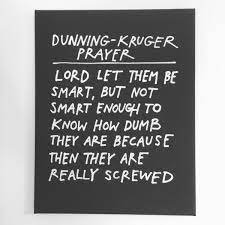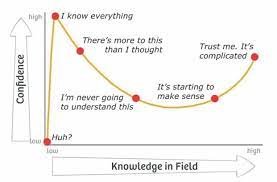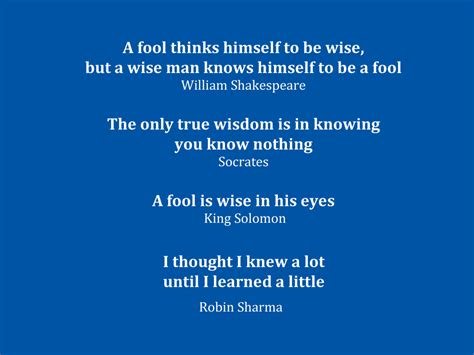The Dunning-Kruger Effect (Why we think that we are good when we are bad)
Motto: In any hierarchy, each individual rises to his own level of incompetence, and then remains there. (Murphy's law).
The Dunning-Kruger Effect is a fascinating research made in 1999 by Justin Kruger and David Dunning, two Cornell teachers, where they asked their own students to take humor and logic tests and estimate how good they are. But long before that, Confucius already discovered this: ''The more you learn, the faster you realize how little you know.''. Basically the ones that were very bad already knew that they are bad, and some really good ones knew they are good, but some were doubting even if they were quite good (Imposter Syndrome). The interesting part is with the ones that were average were slightly above average, as this ones were thinking that they are quite good. As one of my teachers use to say, and expert is a person learning more and more about a niche that is smaller and smaller, until they know everything about nothing.
In terms of ability, being a novice, you know whre you stand. But somewhere between amateur and expert, people see themselves as masters of the game. Achieving mastery, you know where you stand, once more, being aware of your shortcomings and knowing how to improve. Achieving virtuosity, being the best of the best, you know your value and you can instantly asses other people value also.
So, the Dunning-Kruger Effect basically is telling us that mediocre people see themselves as very good at what they are doing. It is a matter of experience, the less skilled you are, the harder it is for you to compare with others, the more skilled you are, the faster you can see where you or others are on the value scale. Untalented people see themselves as geniuses, and all the worst performance videos related to singing, martial arts or whatever, where somebody is really bad at what they do, but very confident, can be seen as examples of the Dunning-Kruger Effect. Darwin use to say that ignorance more frequently begets confidence than does knowledge.
Thinking that you are good at some games, playing against your friends, and then playing against a Pro player and getting obliterated is another example.
Remember, being very bad or very good at something will help you to assess your skill level corectly, but being average will make all this difficult. To avoid this Dunning-Kruger Effect, search for somebody that already achieved mastery or virtuosity in a domain where you want to improve, and compare yourself with that person. If you are not that good, chances are that you need all the extra work to improve. Do not be one of those people believing that they are smarter and more capable than they really are.
Remember that Yeats said that “The best lack all conviction, while the worst are full of passionate intensity.” .
Posted with STEMGeeks



Congratulations @heruvim1978! You received a personal badge!
You can view your badges on your board and compare yourself to others in the Ranking
Check out the last post from @hivebuzz:
Support the HiveBuzz project. Vote for our proposal!